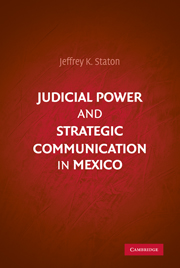Book contents
- Frontmatter
- Contents
- List of Tables
- List of Figures
- Acknowledgments
- PART I JUDICIAL COMMUNICATION AND JUDICIAL POWER
- PART II THE POLITICS OF CONSTITUTIONAL REVIEW IN MEXICO
- 3 Public Relations on the Mexican Supreme Court
- 4 Decisions, Case Promotion, and Compliance
- PART III RELATIONSHIPS BETWEEN TRANSPARENCY AND LEGITIMACY
- References
- Index
3 - Public Relations on the Mexican Supreme Court
from PART II - THE POLITICS OF CONSTITUTIONAL REVIEW IN MEXICO
Published online by Cambridge University Press: 06 July 2010
- Frontmatter
- Contents
- List of Tables
- List of Figures
- Acknowledgments
- PART I JUDICIAL COMMUNICATION AND JUDICIAL POWER
- PART II THE POLITICS OF CONSTITUTIONAL REVIEW IN MEXICO
- 3 Public Relations on the Mexican Supreme Court
- 4 Decisions, Case Promotion, and Compliance
- PART III RELATIONSHIPS BETWEEN TRANSPARENCY AND LEGITIMACY
- References
- Index
Summary
Roughly six weeks after Fox won the Mexican presidency, his transition team on justice and public security, led by Senator Francisco Molina Ruiz and José Luis Reyes, joined members of the Supreme Court for breakfast and a conversation about the president-elect's judicial reform agenda. Fox proposed moving control over the federal agrarian, labor, and administrative courts from the executive branch to the administrative arm of the federal judiciary. More importantly, he proposed transforming the federal attorney general's office (PGR) into something like the U.S. Justice Department and creating a new cabinet position on security and justice services.
The meeting garnered significant national media attention; however, none of Fox's proposals reflected the Supreme Court's concerns. Still, Supreme Court President Genaro Góngora took advantage of the well-publicized opportunity and hosted a midmorning press conference. Góngora argued for a constitutional amendment guaranteeing the federal judiciary a yearly appropriation level between 3 and 6 percent of the federation's total expenditures. Budget reform was a pressing institutional matter for the Supreme Court in light of crushing caseloads and a budget allocation that had dropped below 1 percent of total federal spending. Góngora presented the transition team with a 13-page comparative analysis of judicial budgets in Latin America and contrasted Mexico's budget with those in countries like Costa Rica, Honduras, and Guatemala, all of which had constitutionally fixed appropriation levels.
- Type
- Chapter
- Information
- Judicial Power and Strategic Communication in Mexico , pp. 53 - 64Publisher: Cambridge University PressPrint publication year: 2010



